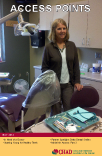Migrant health clinic in Willmar, Minn., seeks new status for expanded patient services
WILLMAR — Crammed into about 900 square feet of space in a commercial strip mall off Willmar Avenue, Willmar Migrant Health Service Inc. is too small for the 3,500 patients it sees each year.
Since the year-around clinic opened in 2009, word is getting around and a wide range of people — not just migrant farm workers — are using the clinic for primary health care that can cost as little as $8 per office call rather than going to costly hospital emergency rooms that can cost hundreds of dollars.
That means savings to taxpayers, according to site manager Lori Boike, who recently told the Kandiyohi County Board of Commissioners that efforts are under way to expand Migrant Health Service's facility and services into a full-fledged community health clinic in the next year or two.
That change in status would bring additional federal and state funding and foundation grants that would allow the private, nonprofit service to move to a larger facility in Willmar and see more patients.
But the application process is long and includes miles of "red tape," said Boike, adding that the decision on whether or not to proceed with the application is up to the Migrant Health Service headquarters in Moorhead.
The initial goal was to have the community health clinic operating by 2012, but she said it may be delayed until 2013.
In a brief interview following the commissioners' meeting, Boike said it could make a difference in the process if the Moorhead office was flooded with letters of support from area community leaders and patients who use the clinic.
"Then they can know what the need is down here," Boike said.
Jay Kieft, family services director for Kandiyohi County, said he and public health director Ann Stehn have already written letters of support. "Willmar needs a community health clinic," Kieft said.
Ideally, the service could use about 4,000 square feet of space so that additional nurses, nurse practitioners or physician assistants could better serve the community, said Boike.
"They really need more room," said Board Chairman Dean Shuck, who visited the current clinic site recently.
While the service targets people working in agriculture, the clinic serves everyone, said Boike. "It is for anybody who needs health care."
That includes low-income people, those who have no insurance and even those who have insurance with a high deductible that makes it unaffordable to use, she said.
With the sliding fee that's based on income, the most that an office visit to Migrant Health Service will cost is about $80. The average cost for low-income patients is $8.
The clinic provides basic primary health care as well as preventive care and education in areas like diabetes, obesity and cardiovascular disease. Because it does not provide some services offered at other clinics — like X-rays and EKGs — the migrant health clinic isn't in competition with local clinics but works in tandem with them, Boike said.
Vouchers for qualified individuals who visit Migrant Health Service cover part of the cost for additional tests and treatments provided by other clinics.
Besides providing first-step health care to people who can't afford to pay typical office visit fees, the clinic is helping keep people out of emergency rooms for simple-to-treat issues like sore throats, said Boike. The high cost of those emergency room visits is often passed onto taxpayers or other hospital users in higher fees.
Commissioner Harlan Madsen said there is an "uneducated use" of emergency rooms, but said people use them because they don't have the resources to pay for a primary care provider.
Migrant Health Service helps fill that gap, said Boike.
The facility also provides bilingual case management and prenatal programs, coordinates mammograms and pap tests for women over 40 and works with other community partners including the county's public health program. A seasonal clinic is also located in Olivia and mobile units travel to agricultural processing sites, like local canneries, to provide health care and education to migrant farm workers.
Carolyn Lange
West Central Tribune

